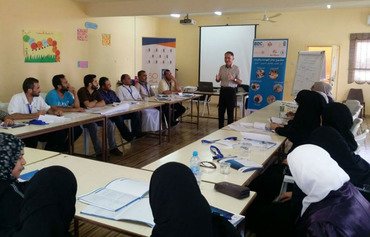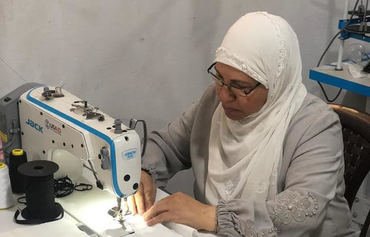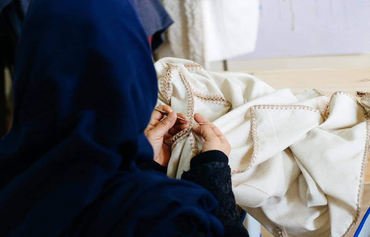Syrian refugees and low-income Jordanians are turning trash into treasure through an upcycling programme that teaches them to make products they can sell with reclaimed materials.
The programme, funded by the German Association for International Co-operation and run by Action Against Hunger, provides temporary work permits to around 1,200 Syrian refugees, nearly half of them women.
Participants, who work on 50-day contracts, are paid 12 Jordanian dinars per day ($16.90) to collect and sort waste from the streets, which is later used to create items like handbags and side tables.
Syrian refugee Salwa Naqarash, 31, told Al-Mashareq she came to Jordan in 2014 with her two daughters and has been living in Irbid with her sister Salam, who also has two children, ever since.
Naqarash, who holds a university degree, had been an English teacher in Syria, where she owned a home and a car and was doing well.
But when she became a refugee, she said, she began facing challenges and was unable to find work to provide for her two children. Her challenges mounted further when she was abandoned by her husband.
"We came to Jordan after two of my brothers and my father were killed," she said. "We did not have a breadwinner and I could not get work. It was very difficult for me at first."
"The pressures increased and I could no longer pay rent or buy food for my daughters," she said. "My sister had the same problem."
"We heard about the Action Against Hunger training programme on the collection of trash and turning it into products, so we decided to join," she said.
"We hesitated at first due to the nature of the work, but then decided we needed the money and work, and would not have to ask anyone for money."
'Breaking the culture of shame'
The initiative is part of a broader programme that benefits needy families by lining up 50-day contracts with local co-operatives, said programme director Sajida Saqallah.
"As part of the programme, the beneficiaries are given a certain amount of money and the collected trash is transferred to specialised parties and ladies who turn it into handicraft products," she told Al-Mashareq.
The sale of these items creates a source of income, she said.
"More than 1,194 people, including 550 women, have benefited from the programme in Irbid," she noted, with more set to benefit when a new phase of the programme is launched.
"The programme has helped integrate Syrians into the local community and build relationships between them and the community," she said.
It also has helped to "break the culture of shame, by encouraging work in trash collection as a livelihood", she added.
Helping people rely on themselves
"I am very happy that I joined the programme, because it changed my life and helped me meet many women from the local community," Naqarash said.
"I got a work permit, and my sister was able to raise a sum of money after joining the programme, so we bought a sewing machine with the money we generated," she said.
"My sister and I are now working from home, and we are sewing clothes, curtains and carpets," she said. "We are making a modest amount of money, but it is helping us meet our needs."
Programmes like this also benefit Jordan's economy as a whole, economist Hossam Ayesh told Al-Mashareq.
"Although the money people are earning is modest, it is helping them rely on themselves," he said, noting that these programmes support refugees and local communities, and thus ease the pressures on Jordan.
"These programmes need to be expanded to include larger numbers," Ayesh added, as they help refugees integrate into Jordanian society and strengthen their communication and ties with their host communities.

![Salwa Naqarash uses a sewing machine she bought with the salary she earned by taking part in the Action Against Hunger programme. [Aida Burnett-Cargill/Action Against Hunger]](/cnmi_am/images/2018/08/22/14046-Jordan-Syrian-refugee-600_384.jpg)







The idea is very, very nice. Keep it up, and good luck!
Reply1 Comment(s)